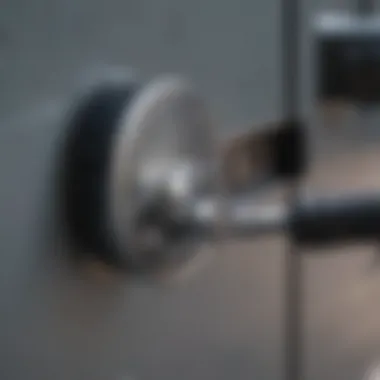Top Trailer Locks for Ultimate Security Solutions


Intro
Securing your trailer is crucial to protect your investments and ensure peace of mind. The importance of selecting the right lock cannot be overstated, especially considering the increasing incidents of theft in today’s world. This guide aims to furnish an in-depth understanding of the various locks available for trailers, delineating their features and benefits, and providing expert recommendations.
Understanding how different types of locks operate is key, as it helps make a more informed decision. Whether you're an enthusiast who regularly uses your trailer or a casual user, the insights detailed in this guide will equip you with the necessary knowledge to choose the best locking solution.
We will analyze essential lock features, compare top models, and address what makes each option unique in the current market. Our objective is to enhance your awareness of trailer security, so you can make a savvy purchase that ultimately protects your assets.
Prolusion to Trailer Security
Ensuring the security of your trailer is an essential consideration for anyone who owns one. Trailers are often used to transport valuable goods, vehicles, or equipment, making them prime targets for theft and vandalism. Inadequate security can lead to significant financial loss and disruptions to your personal or business operations.
Importance of Securing Your Trailer
The significance of trailer security cannot be overstated. Securing your trailer safeguards your investments and protects your peace of mind. When a trailer is properly secured, it acts as a deterrent against theft, which can save you from financial strain. The repercussions of not securing a trailer can be severe; loss of equipment, delivery delays, or even legal liabilities if your trailer is involved in a crime after being stolen.
Moreover, secure trailers contribute to overall safety in transport, reducing the likelihood of accidents caused by loose or abandoned equipment left unsecured. By investing in effective locks and security devices, you demonstrate responsibility toward both personal assets and community safety.
Common Threats to Trailer Safety
Understanding the risks associated with trailer ownership is crucial for effective security planning. Here are some common threats:
- Theft: This is the most prevalent threat. Thieves often look for unattended trailers, especially those parked in dimly lit areas or left for long periods.
- Vandalism: Unscrupulous individuals may damage trailers whether to gain access or for satisfaction.
- Improper Loading: A poorly secured load can lead to accidents or loss of cargo.
- Environmental Factors: Conditions like extreme weather may also compromise trailer integrity; for instance, flooded areas can damage electronics.
"Security measures must be proactive rather than reactive to significantly decrease the chances of loss or damage."
In summary, trailer security involves understanding its importance, the potential hazards involved, and implementing measures to mitigate these risks effectively. By focusing on prevention and lockdown procedures, trailer owners can better protect their investments.
Overview of Trailer Locks
Securing a trailer is an essential part of vehicle safety. The locks used on trailers serve as a crucial barrier against theft and unauthorized access. This section will provide a detailed look at different types of trailer locks, their functions, and how they contribute to overall security. By understanding various locking mechanisms, the reader can make informed decisions about which locks will best protect their assets.
Types of Trailer Locks
Understanding the categories of trailer locks is vital for effective security measures. Each type of lock offers unique advantages and is designed for specific purposes. Let's explore the four main types of trailer locks.
Coupler Locks
Coupler locks are designed specifically for locking the coupler of a trailer to the tow vehicle. This lock prevents the trailer from being uncoupled. The key characteristic of coupler locks is their robust construction, typically made from hardened steel. This makes them a popular choice among trailer owners. Their unique feature is the ease of installation—the lock can often be applied quickly without special tools.
However, coupler locks do have disadvantages. For example, if not properly fitted, they may become loose and ineffective. Still, when used correctly, they provide a significant deterrent against trailer theft.
Wheel Locks
Wheel locks provide a different approach by immobilizing one or more trailer wheels. This type of lock attaches directly to the wheel, preventing movement. The key characteristic of wheel locks is their visibility; they are often brightly colored or designed to be very noticeable, making it clear to would-be thieves that the trailer is secure. Such locks are beneficial because they are effective against potential theft attempts.


A unique feature of wheel locks is their adaptability to various wheel sizes and styles, ensuring a wider applicability. However, they can be cumbersome to install, and if a thief is determined, they might still find a way to steal the trailer by removing the wheel.
Latch Locks
Latch locks focus on securing the hatch or door of the trailer. These locks are typically mounted on the latch mechanism, preventing access to the trailer contents. The key characteristic of latch locks is their simplicity and effectiveness. They are commonly used for trailers with side or rear doors. One benefit is that they are generally low-cost and easily replaceable.
The unique feature of latch locks is their ability to function seamlessly with various latch types. However, their downsides include potential vulnerability to bolt cutters, which can be used by skilled thieves.
Foldable Locks
Foldable locks offer a flexible solution for securing trailers. These locks can be extended to various lengths, allowing for adaptability to different securing points. The key characteristic of foldable locks is their portability. They can easily be stored when not in use, making them an appealing option for trailer owners who value both security and convenience.
The unique feature of foldable locks is their versatility, as they can secure multiple components simultaneously. Nonetheless, they may not offer the same level of strength as other locks, and their installation process can be more complex, potentially requiring some time to get it right.
How Trailer Locks Work
Trailer locks function by restricting access to critical points of a trailer. Most locks use either a key or a combination mechanism that must be engaged to unlock. The lock mechanism interacts with a physical component, such as a hitch or latch, holding it securely in place.
Understanding the working principles of each lock type enhances decision-making. For example, knowing that a coupler lock directly secures the hitch gives insight into its importance over a wheel lock in some situations. It also illustrates how various locks can complement each other, thus increasing overall security effectiveness.
"Effective trailer locks not only deter thieves but also provide peace of mind for owners."
In summary, choosing the right type of trailer lock is essential for enhancing security. Each lock offers distinct benefits, allowing users to select based on specific needs and trailer configurations. By integrating multiple locking solutions, trailer owners can achieve a comprehensive level of security.
Factors to Consider When Choosing a Trailer Lock
When selecting a trailer lock, several factors play critical roles in ensuring your trailer's security. An informed choice not only protects your assets but also offers peace of mind. Identifying the most important elements can greatly affect the overall effectiveness of the lock. Here are the primary considerations that should guide your decision.
Material and Construction
The material from which a trailer lock is built significantly impacts its durability and ability to withstand attempts at tampering or forced entry. High-quality materials, such as hardened steel or alloy, can resist cutting, grinding, or drilling.
Additionally, look for locks that feature corrosion-resistant finishes, especially if the trailer will be exposed to the elements. A lock that deteriorates due to rust renders all security measures ineffective. To make a smart purchase, evaluate locks based on their construction methods, whether they incorporate additional layers of defense, and their resistance to environmental damage.
Locking Mechanism
The locking mechanism used in a trailer lock is fundamental to its security capabilities. Different types of mechanisms vary widely in effectiveness. For instance, traditional key locks may be easy to pick, while disc detainer locks or pin tumbler locks present a higher barrier against unauthorized access.
Moreover, consider locks equipped with smart technology, which can provide alerts and remote locking capabilities. Still, assess the reliability of these advanced features to ensure they do not compromise overall security. Research different types of locking mechanisms and their respective advantages and vulnerabilities to make an informed choice.
Compatibility with Trailer Model
Compatibility is often an overlooked aspect when choosing a trailer lock. Not every lock will fit all trailer models due to size and design variations. Before purchasing, it is essential to measure the locking point on your trailer and ensure that the lock you choose will fit securely without any modifications.
Many manufacturers provide specifications or compatibility lists for their locks, helping you make a suitable selection. It's critical to avoid a lock that doesn’t match your trailer’s design; otherwise, the lock will not serve its intended purpose.
Ease of Use


When evaluating trailer locks, the ease of use cannot be discounted. A complicated installation or locking process can discourage regular use and lead to vulnerability. Ensure that any lock you consider is user-friendly.
Look for features such as simple key entry, quick-release mechanisms, or intuitive design that facilitates access and operation. Testing the lock before purchase can provide practical insight, ensuring you can use it efficiently in various situations.
Price vs. Value
Price often plays a central role in purchase decisions, but it's imperative to weigh it against the value delivered. While cheaper locks may seem appealing, they could lack the necessary durability or security features, which could lead to costly losses later. Evaluate the features provided in relation to the cost.
It's also wise to search for customer reviews and performance ratings to gauge the lock's effectiveness compared to its price point. A lock that is expensive may offer long-term savings due to reduced risk of theft or damage, whereas a less expensive option might have hidden costs due to poor performance.
In summary, a thoughtful approach to selecting a trailer lock should consider these factors. Paying attention to materials, locking mechanisms, compatibility, ease of use, and overall value against the price can lead to better choices. Prioritize these attributes to enhance your awareness and effectiveness in securing your trailer.
Top Recommendations for Trailer Locks
In the world of trailer security, the right lock can serve as your trailer's first line of defense. Choosing the best locks means understanding various models to find one that fits your needs perfectly. The following sections will detail specific recommendations including coupler locks, wheel locks, latch locks, and foldable locks. Each type serves a unique purpose and works differently depending on the design of your trailer.
Select wisely to keep your trailer protected. A strong and effective lock can save you from potential financial loss and the inconvenience of theft.
Best Coupler Locks
Overview of Top Models
When it comes to coupler locks, models like the Bully Lock and Reese Towpower Coupler Lock stand out. These locks are designed to fit around the coupler portion of your trailer, securing it to the towing vehicle. Their key characteristic lies in their robust construction, often made from heavy-duty materials that resist cutting and tampering. A major advantage of these locks is their ease of installation. You can usually secure them in just a few seconds.
However, some models may not suit all trailer designs, which is a crucial factor to consider before purchase.
Strengths and Weaknesses
The primary strength of coupler locks is their deterrent value. A secure lock at the coupler can discourage thieves from attempting to hitch and steal your trailer. Nevertheless, a potential weakness is that if a thief knows how to disengage the coupler, they can bypass the lock. In this sense, having additional security measures in place is recommended.
Best Wheel Locks
Overview of Top Models
Top choices for wheel locks include the Mighty Mule Wheel Lock and the McGard Wheel Lock. These locks clamp onto your trailer’s wheel, securing it and preventing movement. A key benefit of wheel locks is their visibility, often acting as a strong visual deterrent to potential thieves. The unique design inhibits the wheel from turning, making it nearly impossible to tow the trailer.
However, some wheel locks may require a specific size adjustment, which can add to inconvenience when frequeintly using your trailer.
Strengths and Weaknesses
The strength of wheel locks lies in their physical barrier against theft. They are an excellent choice for securing trailers on storage lots. Still, their major weakness is that they can be cumbersome to attach and detach, which might deter you from using them daily.
Best Latch Locks
Overview of Top Models
For latch locks, models like the Master Lock Latch Lock and Socket Latch Lock are quite effective. These locks fit over the latch mechanism that secures the trailer door. The key characteristic of such models is their design; they offer a straightforward solution without complicated setups. A major plus is their low profile, which allows for an aesthetic appeal on your trailer.


However, latch locks can be less effective against skilled thieves who might be aware of possible tricks to bypass them.
Strengths and Weaknesses
The strength of latch locks is their convenience and ease of use. Compared to other lock types, they provide quick access. Yet, they might not provide the same level of security as more robust options, so consider your security needs when selecting one.
Best Foldable Locks
Overview of Top Models
Among foldable locks, the OnGuard Folding Lock and Kryptonite Keeper offer high-security features. These locks can be configured to fit various securing points on your trailer, offering flexibility. Their main advantage is the ability to fold away when not in use, making them easy to transport.
However, folding locks can be heavier than traditional locks, which might be a consideration if you prioritize lightweight gear.
Strengths and Weaknesses
The strength of foldable locks lies in their versatility and high security. They provide a lot of protection with relatively low space utilization. Nevertheless, their complexity could deter some users who prefer simpler locking mechanisms.
By understanding these recommendations for trailer locks, you position yourself to make a more informed decision when securing your trailer. Each lock type has distinct features that cater to various security needs and preferences. Evaluate your specific situation and choose accordingly.
Installation and Maintenance of Trailer Locks
The installation and maintenance of trailer locks are critical components that directly influence their reliability and effectiveness. A well-installed lock acts as a strong deterrent against theft, while regular maintenance ensures that the lock operates smoothly over time. By understanding proper installation techniques and maintenance practices, trailer owners can maximize the security of their valuable assets.
Installation Guidelines
Installing trailer locks may seem straightforward, but there are important considerations to ensure optimal security. Here are several key steps to follow during installation:
- Choose the Right Lock: Selecting a lock that is compatible with your specific trailer model is essential for effective security. Ensure that the dimensions and locking features align with your trailer's specifications.
- Read the Instructions: Always start by reading the manufacturer's installation instructions carefully. This will give you valuable insights into the correct installation process.
- Positioning the Lock: Place the lock in a location that is less accessible to potential thieves. For coupler locks, positioning it so that it covers the hitch area makes it difficult for someone to detach the trailer.
- Check Alignment: Ensure that all components are aligned properly before securing the lock. Misalignment can weaken security.
- Secure Fastenings: Tighten all bolts, screws, and fastenings firmly. Loose components can reduce the lock's effectiveness and may lead to malfunction.
- Test the Lock: After installation, test the lock multiple times to confirm that it operates smoothly and securely. Check that it latches correctly and is resistant to picking.
Seeking professional help or guidance can also be beneficial, especially for more intricate locking systems.
Regular Maintenance Practices
Regular maintenance enhances the longevity and reliability of trailer locks. Establishing a maintenance routine is vital to ensure that locks function as intended. Here are some effective practices:
- Clean the Lock: Remove dirt and debris from the locking mechanism. A clean lock prevents rust and ensures a smooth operation.
- Lubricate Moving Parts: Use a suitable lubricant to keep the moving parts of the lock functioning properly. Silicone spray or graphite powder works well. Avoid oil-based lubricants, as they can attract dirt.
- Inspect for Damage: Regularly check the lock for any signs of wear or damage. If you notice any issues, replace the lock immediately to maintain security.
- Weather Protection: If your trailer is exposed to the elements, consider applying protective coatings to prevent rust and corrosion. Store the lock indoors when not in use to enhance durability.
- Test the Lock on a Schedule: Periodically test the locking mechanism to ensure that it engages and disengages smoothly. This helps identify potential problems early before they escalate.
Proper maintenance is just as important as installation for ensuring long-lasting security and performance.
By adhering to these installation guidelines and maintenance practices, trailer owners can significantly reduce the risk of theft and improve the overall functionality of their locks. Investing time in these processes pays off in the long run, safeguarding both the trailer and its contents.
Epilogue
In the context of securing trailers, the conclusion underscores the essential role that effective locking mechanisms play. With the increasing incidences of theft or unauthorized use of trailers, it is crucial to prioritize security. Selecting the right lock not only protects the valuable items within but also ensures peace of mind for the owner. A good lock system acts as a deterrent against potential threats.
Final Thoughts on Trailer Security
Trailer security is multifaceted. It requires careful consideration of various factors, such as the type of lock used, compatibility with the trailer model, and ongoing maintenance requirements. Investing in high-quality locks can save time and money in the long run, not just in securing property but also in averting loss due to theft.
When evaluating options, prioritize those that combine durability with ease of use. For many, the process of installing and maintaining locks is often overlooked, but these steps are vital in ensuring that security measures remain effective. As the adage goes, "A chain is only as strong as its weakest link." Ensuring all aspects of trailer security are robust can greatly minimize risks.
"Efficiency in security measures directly correlates to the overall safety of your trailer."
In summary, as a trailer owner, securing your investment should be a top priority. Utilize this guide to assess the best locks available, taking into account personal needs and situations. Make informed choices and regularly update your security measures as necessary to stay ahead of potential threats.















